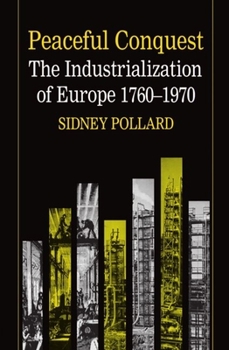Peaceful Conquest - The Industrialization of Europe 1760-1970
Select Format
Select Condition 
Book Overview
468 pages. This description may be from another edition of this product.
Format:Paperback
Language:English
ISBN:0198770952
ISBN13:9780198770954
Release Date:June 1981
Publisher:OUP Oxford
Length:464 Pages
Weight:0.05 lbs.
Dimensions:1.4" x 6.1" x 9.2"
Related Subjects
Business Business & Investing Education & Reference Europe History Industries & ProfessionsCustomer Reviews
2 ratings
Still a reference work
Published by Thriftbooks.com User , 15 years ago
Peaceful Conquest, published in 1981, remains a textbook rendering of the processes by which Europe industrialised. Ranging from the early stages to the post-war era, Pollard's book concentrates especially on beginnings, on the nineteenth century. Following Gerschenkron's model, it examines the lag between late and early industrialisers. But this is a descriptive more than a programmatic account. Pollard is a historian of the regional school, meaning that he believes industrialisation should be accounted for based on regional more than national endowments, but he makes no dogma of it. He also seems agnostic as to the (now largely discredited) role of proto-industry, or cottage industries. Pollard's writing is easy to follow and inspired by useful and interesting examples, such as how Belgian industrial espionage brought the first jennies and steam engines to the continent. The book follows a very graspable thematic-chronological as well as geographical plan. The only reproach that could be made is that much quantitative research has taken place since its first issue, producing rich statistical estimates of GDP and other measures, and that Peaceful Conquest could have been updated with a numerical section.
Excellent exposition of unique view of European Development
Published by Thriftbooks.com User , 25 years ago
Pollard approaches the economic development of Europe on a regional rather than a national basis. He argues that the regions that developed economically where those which had adequate supplies of coal, the main industrial fuel during the period. While controversial, the thesis is well argued. The writing is clear and well-organized. The book is a must read for any student of European History.






